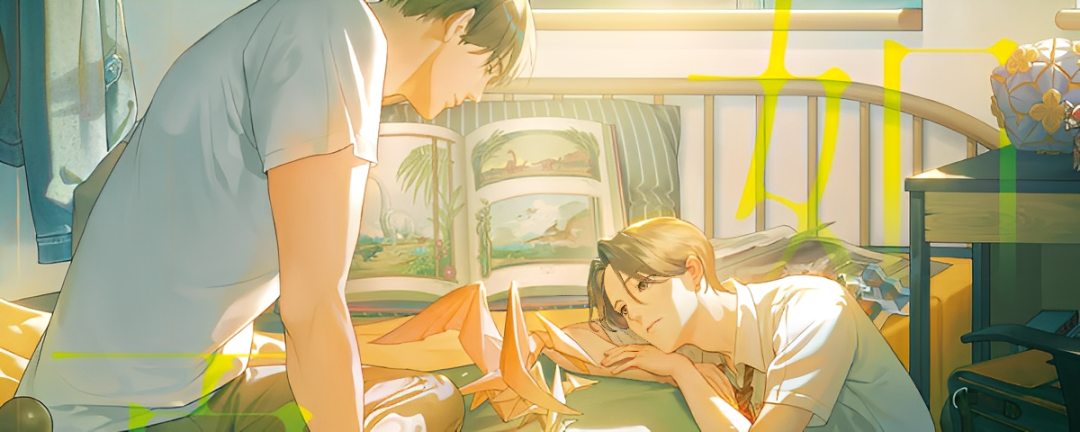BOSF 006: Standing Up for Justice
by cloudiesAt 7:25 a.m., it was still early, and the school was a twenty-minute walk away. Ji Yan usually left early, but today, with Xiang Yang in tow, he was extra cautious, worried about unexpected delays causing them to be late.
More students were heading to school at this hour, all going the same way, wearing the same uniforms. Those they passed looked curiously at Ji Yan and Xiang Yang.
Ji Yan initially thought nothing of it—two students walking to school together was normal. But a boy holding another boy’s sleeve seemed a bit odd.
He wasn’t sure about others, but at his age, Ji Yan was aware of gender norms, with secondary sexual characteristics starting to develop. Around fifth or sixth grade, teachers taught that boys and girls shouldn’t be too intimate, especially avoiding touching private areas like a girl’s chest or a boy’s crotch. Most students followed this, but a few mischievous boys would jokingly target other boys, sneaking up to grab their privates or tug their pants for fun. Whether successful or not, it often led to playful scuffles, with bystanders jeering, laughing at the “childish” boys “acting gay.”
Ji Yan didn’t know why this came to mind, but he realized holding Xiang Yang’s sleeve might be seen as “acting gay” by those standards.
Both he and Xiang Yang were around 160 cm tall, nearly able to look adults in the eye. Boys roughhousing was normal, but lingering too close or making odd gestures could get you labeled effeminate, accused of liking boys, or called a pervert.
In this rural town, “homosexual” was a derogatory term. Though TV showed same-sex love stories, in reality, they weren’t accepted. Wasn’t that strange?
Ji Yan once saw such a drama, only for his mother to snatch the remote, change the channel, and scold, “Why watch this? You’re not allowed to be ‘abnormal,’ got it?”
In his upbringing, most households were similar. His father, for instance, leaned toward traditional masculinity. As the head of the family, a man had to be responsible, not timid or “girly.” Influenced by tradition, continuing the family line was a major duty, making homosexuality unacceptable—a violation of norms, something only “perverts” did, deemed abnormal.
Realizing this, Ji Yan let go of Xiang Yang’s sleeve. He wasn’t romantically aware and didn’t think he was gay, but he feared others’ judgment.
He was always obedient, but that obedience meant fitting in with the majority, not standing out as different.
The moment he let go, Xiang Yang stopped following. While walking, Xiang Yang never looked at Ji Yan, his gaze wandering to distant mountains, nearby fields, or weeds on the ground, quiet and silent. Once Ji Yan released him, it was as if his tether vanished, setting him free.
Xiang Yang freely pursued whatever caught his attention in his own world, ignoring the curious stares of passersby. He stood by a utility pole, gazing into the distance. As his mother said, he’d fixate on something, staring without anyone knowing what he saw or thought.
Afraid he’d wander off, Ji Yan hurried after him, hyper-aware of others’ gazes. Standing beside him, he whispered, “Xiang Yang, let’s go…”
He didn’t dare grab him again, fearing misinterpretation.
But Xiang Yang remained oblivious to the sounds around him, staring ahead.
From the outside, nothing suggested Xiang Yang had any condition. He looked like an ordinary thirteen-year-old, showing signs of growth, maturing. His profile, like Ji Yan’s, was still youthful, but his features were developing. He inherited his mother’s beauty—striking eyes and long lashes—and his father’s deep contours and strong jawline.
At 7:30 a.m., the sun, newly risen, wasn’t harsh. Its soft light bathed Xiang Yang’s face, casting a hazy glow, making his distant gaze seem resolute and fearless.
Ji Yan’s heart stirred. He saw a different Xiang Yang—not weak, not suffering from his condition.
His mother once mentioned, while chatting with others, that Xiang Yang’s father was the village’s handsomest man in his youth, with high standards, which is how he married someone as beautiful as Xiang Yang’s mother. A handsome man and a beautiful woman naturally produced an attractive child.
Having never closely observed Xiang Yang’s face, Ji Yan now noticed he was indeed good-looking—the type boys admired and girls liked. But his condition overshadowed this, with people only seeing his “abnormal” behavior.
Looking at Xiang Yang, Ji Yan felt an unexpected calm.
If anyone was an outsider in this village, it was Xiang Yang. Ji Yan knew the students’ stares were because of him.
Xiang Yang had been pointed at and gossiped about his whole life, yet he wasn’t afraid. What did Ji Yan have to fear?
He was just helping a classmate.
With this realization, Ji Yan tugged Xiang Yang’s sleeve again, less concerned about others’ looks. “Xiang Yang, let’s go.”
Xiang Yang didn’t move.
Ji Yan hesitated, then reached for his arm. Seeing Xiang Yang didn’t swat him away like before, he boldly grabbed his forearm, pulling him along firmly.
“We’ll be late if we don’t hurry,” Ji Yan grumbled, using a tone he’d use with a friend. He didn’t want to speak to Xiang Yang like his mother did, as if he were a child. It felt wrong. If Ji Yan were Xiang Yang, with normal intelligence, he wouldn’t like being treated that way either. It would feel like the world was moving forward while he was stuck in place, forced to watch others drift further away.
Xiang Yang’s condition limited his ability to express himself, but he wasn’t without feelings.
Ji Yan knew he might be presumptuous, projecting his own feelings onto Xiang Yang. But what could he do? They were neighbors, constantly crossing paths. Growing up, he’d heard endless talk about Xiang Yang’s family, about Xiang Yang himself. Tired of it, he couldn’t help but empathize, couldn’t help but want to stand up for him.
Focused on pulling Xiang Yang along, Ji Yan didn’t notice that Xiang Yang had shifted his gaze, looking down at his arm where Ji Yan held him. After a moment, he looked away, taking in the surroundings.
Before 8:00 a.m., Ji Yan got Xiang Yang to Class 4’s classroom on time. This drew attention from both his class and Class 4, with students speculating about their relationship.
Ji Yan had wanted to part ways at the school gate, knowing the closer they got to the classrooms, the more people would recognize them. He wasn’t one for attention and found it awkward, dreading this atmosphere. But he still brought Xiang Yang to his classroom, driven by his sense of responsibility and a bit of compassion.
As expected, back in his own class, the student in front of him turned and asked, “Ji Yan, why were you walking with Xiang Yang?”
Curious eyes turned toward him.
Ji Yan opened his mouth, tempted to say it was Xiang Yang’s mother’s request and he didn’t want to, but that would easily lead to “Xiang Yang’s a burden.” He knew many classmates thought this, and it wasn’t just one or two—it was an accepted “fact.” Because it was “true,” people felt free to say it, hurting others. Ji Yan didn’t want to be that person and refused to be. “We’re neighbors.”
“Oh~” His answer piqued their curiosity further, and they bombarded him with questions about Xiang Yang’s family, expecting gossip or embarrassing stories to laugh at or satisfy their curiosity.
Though Ji Yan knew they meant no harm, he grew irritated.
Usually sociable and friendly, his classmates were surprised when he snapped, visibly displeased, “There’s nothing to say.”
The conversation ended abruptly, awkwardly.
Realizing they’d overstepped, some classmates backed off, touching their noses. Others whispered that he was stingy, that sharing wouldn’t hurt.
Ji Yan ignored them, calming his anger. He wasn’t sure why he felt compelled to protect Xiang Yang, but expressing his feelings left him oddly relieved.


0 Comments